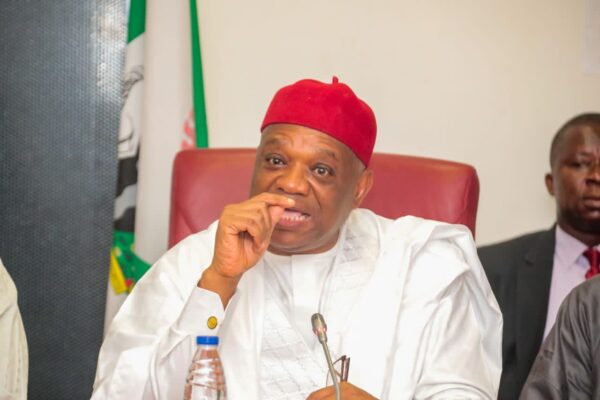Sunday Aborisade in Abuja
The Senate on Thursday suspended further consideration of the proposed amendments to the Electoral Act 2022 following a heated debate that exposed deep divisions among lawmakers over the scope and content of the proposed changes.
The decision came after Senate President Godswill Akpabio raised concerns about the lack of clarity in the amendment proposals and used the opportunity to reflect on what he described as “grave injustice” meted out to him during the 2019 general election.
The process had begun smoothly after the Chairman of the Senate Committee on Electoral Matters, Senator Simon Lalong (Plateau South), led debate on the general principles of the Electoral Act Amendment Bill, 2025.
However, deliberations soon turned contentious when Senator Titus Zam (Benue North East) urged the Senate to pass the bill for second reading, prompting Akpabio to demand specifics on what aspects of the 2022 law were being amended.
The Senate President pressed further, calling on Lalong to clearly outline the “nitty gritty” of the proposed amendments before the chamber could proceed.
Akpabio, while addressing his colleagues, digressed into his personal experience during the 2019 elections, alleging that he was unfairly treated in the aftermath of the Akwa Ibom North West Senatorial contest.
Akpabio said: “What happened during the 2019 elections was unjust. The legislation was clear, yet those who were supposed to uphold it acted otherwise.
“The returning officer, Professor Peter Ogban, who served for 34 years at the University of Calabar, was wrongly sentenced to three years in prison instead of those truly responsible for electoral infractions.”
He faulted the Independent National Electoral Commission (INEC) for what he described as selective enforcement of justice.
“The court had ordered that those who committed the offence be prosecuted, but INEC went after the wrong person. If the returning officer was really helping me, how come my votes were the ones affected?” He asked.
The Senate President further criticised the length of electioneering timelines, arguing that prolonged campaign seasons and transition delays often diminish the effective tenure of elected officials and hamper governance.
“Campaigns last for months, and then there are long pre-election processes. When appointees later become ministers, it disrupts governance and the timeline for national development. We must look at how to balance our electoral timetable with efficient administration,” Akpabio said.
Following the exchanges, Senate Leader Opeyemi Bamidele (Ekiti Central) moved a motion that the bill be stood down to allow the Committee on Electoral Matters to provide detailed clarification on the proposed amendments. The motion was unanimously adopted.
With this decision, legislative consideration of the Electoral Act Amendment Bill, 2025, which seeks to regulate future elections and proposes that the 2027 presidential and governorship polls be conducted in November 2026, has been temporarily suspended.
For now, the Senate leadership has insisted that further debate will not resume until lawmakers are adequately briefed on the details of the amendment proposals and their implications for the 2027 general election.
The setback came just days after the National Assembly’s Joint Committees on Electoral Matters in both chambers held a public hearing on the bill, where stakeholders made wide-ranging submissions on timelines, technology deployment and election logistics.
At the public hearing on Monday, representatives of INEC, civil society organisations, political parties and legal experts canvassed for stronger provisions on electronic transmission of results, campaign finance regulation and stricter penalties for electoral offenses.
Several participants also urged the National Assembly to harmonise election timelines to reduce post-election litigations and ensure a smoother transition between administrations.
Among the key amendments being proposed, the bill seeks to alter the timeline for the conduct of general election, moving presidential and governorship polls from February to November of the preceding year.
The objective, according to the drafters, is to create a clear transition period that allows for smooth handover of power, timely resolution of election petitions, and better budgetary planning for incoming administrations.
Another major amendment aims to strengthen the use of technology in the electoral process, by giving statutory recognition to electronic transmission of results and electronic collation of votes.
This provision is designed to remove ambiguity in the 2022 Act and ensure uniformity in the application of digital tools across polling units and collation centres nationwide.
The bill also proposes diaspora voting, stricter controls on campaign financing, and internal party democracy, with new ceilings on campaign spending and enhanced disclosure requirements for political donations.
It further seeks to establish an Electoral Offences Commission with powers to investigate and prosecute election-related crimes, a move stakeholders say will promote accountability and deter manipulation of results.


